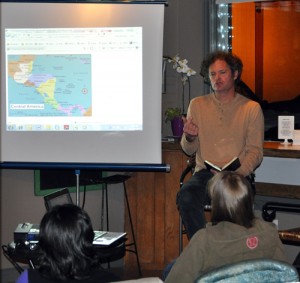
By David F. Rooney
Canadian mining companies in Central America are leaving a legacy of community and environmental destruction that might only be remedied if until-now-ignorant Canadians force them to do the right thing, says an activist with more than 20 years experience in Latin America.
“They hide behind the rule of law in those countries and act with impunity because they cannot be held accountable,” Grahame Russell, co-director of the small non-profit organization Rights Action.
Russell, who has been touring Kootenay communities such as Nelson, Kaslo, Grand Forks and now Revelstoke, said well-known mining giants like Skye Resources and Gold Corp. claim to be acting legally in places like Guatemala and Honduras, but in reality are responsible for the destruction of local indigenous communities and in the case of Gold Corp., are actively destroying the environment and threatening the health of rural people in Honduras.
Russell outlined his accusations during a meeting at Sangha Bean Cafe Tuesday evening that was attended by about 16 people. That doesn’t sound like very many people but considering the deep cold Tuesday evening and the fact that the cafe was a tiny venue that’s actually pretty good. Krista Cadieux’s small establishment was jammed with people eager to see two short films that Russell brought with him. (You can view the films below.)
“This is not an anti-mining issue,” he said. “This is a deeply Canadian issue. This is a Canadian policy issue.”
Russell said the Canadian government is aware of the damage being caused by Canadian mining companies in Guatemala and Honduras but chooses not to intervene because one of its main diplomatic goals is the furtherance of Canadian economic interests in those countries.
While many Canadians might regard this as an issue for those countries’ national governments to pursue, they should be aware that both countries have histories of violent state repression (including the use of torture and “disappearing” or assassinating troublesome dissidents) and the maintenance of a system of social inequality that suits their ruling oligarchies and the military establishments they use to prevent deep social and economic changes.
The people most affected by the Canadian mining companies Russell discussed are rural peasants with no real voice in government.
So how can ordinary Canadians seek to affect change? They can view the films below then lobby their MPs for action and, perhaps most importantly, press the Canada Pension Plan and all private pension funds that have investments in mining giants like Inco and Gold Corp. to demand changes to the way they conduct themselves abroad. Or they can demand that these pension funds divest themselves of their interest in Canadian mining companies.
But why not make up your own mind. The first short film below, Violent Evictions at El Estor, Guatemala, illustrates how Mayan peasants in Guatemala were evicted from their land in 2007 by the Guatemala government and police in order to allow Skye Resources, which was later bought by HudBay Minerals, to operate on it. Mineral rights on that land were acquired by Inco in 1965, Russell said, adding that Sky Resources acquired the rights from Inco in 2004. Skye was later bought by HudBay Minerals.
The following six clips constitute a film called All Glitters Isn’t Gold about how the health of rural people is being ravaged and their environment destroyed by a Gold Corp. open-pit mine in Honduras. Some of the scenes in that film are quite graphic.
You can find out more about Russell’s organization at www.rightsaction.org. In the meanwhile, here are the films:



